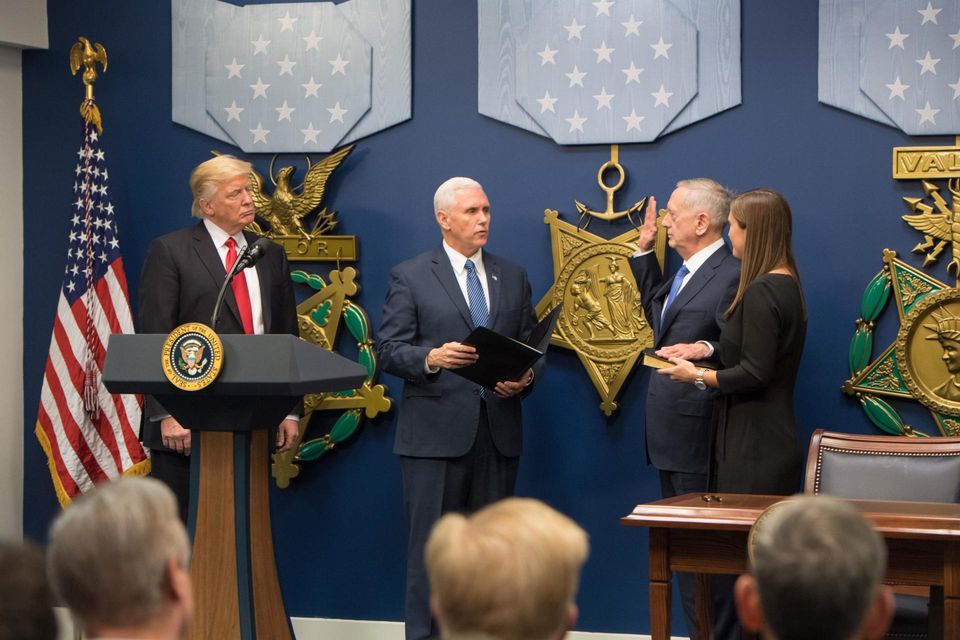Operationele energie hoog op de DOD agenda.
Marcel Hendriks • 15 februari 2017
This is a subtitle for your new post

Mattis aanjager van Operationele Energiestrategie
Bij het aantreden van een nieuwe Amerikaanse regering worden kandidaten voor ministersposten ondervraagd door de Senaat. Op basis daarvan stemt de Senaat al-dan-niet in met de benoeming tot minister. De kandidaatminister voor Defensie James Mattis werd gevraagd naar het belang van het terugdringen van de afhankelijkheid van fossiele brandstoffen voor de inzet en de gevechtskracht van de Amerikaanse strijdkrachten.
Transcript of nomination hearing for General James Mattis to be Secretary of Defense. Senate Armed Services Committee, January 12, 2017:
Senator Saheen: Thank you, Mr. Chairman. Welcome, General Mattis. And thank you for your willingness to continue to serve this country. I have read that in 2005, as Commander of the Marine Corps Combat Development Command, that you asked researcher to, quote, unleash us from the tether of fuel and explore ways to improve the efficiency of military vehicles in order to reduce the strain that energy put on supply lines. Because you not only when you commanded the First Marine Division during the 2003 invasion, but you had also seen what happens when our troops outran their fuel supplies. So can you speak to why you think this is important? And will you as Secretary of Defense continue to support the military's effort to pursue alternative and more efficient sources of energy to reduce our reliance on conventional fuel supplies?
General Mattis: Yes Senator, we will take advantage of every advance in terms of extending our legs extending our energy efforts, and certainly there's a lot of progress that's been made. I've been living in Silicon Valley for the last several years, so you can understand my interest in what they're doing out there in the private sector.
Advanced policy question for General James Mattis, Nominee to be Secretary of Defense, January 2017.
During your time in Iraq, you called on the Department to “unleash us from the tether of fuel.” What exactly did you mean and what experiences led to that comment?
I meant that units would be faced with unacceptable limitations because of their dependence on fuel, and that I wanted to be able to push those limits further. Meanwhile, our efforts to resupply the force with fuel made us vulnerable in ways that were exploited by the enemy.
Do you believe this issue remains a challenge for the Department of Defense?
Yes.
If confirmed, what will you do to unleash the Department from the tether of fuel?
The Department’s acquisition process should explore alternate and renewable energy sources that are reliable, cost effective, and can relieve the dependence of deployed forces on vulnerable fuel supply chains to better enable our primary mission to win in conflict. The purpose of such efforts should be to increase the readiness and reach of our forces.
If confirmed, what priorities would you establish for Defense investments in and deployment of operational energy technologies to increase the combat capabilities of warfighters, reduce logistical burdens, and enhance mission assurance on our installations?
Investments in energy technologies should be prioritized according to the same standard as any other Department decision to invest in basic research and technology development, namely: their direct contribution to achieve the Department’s primary missions; potential return on investment; protection of US national security interests; and contribution to enhancing readiness and combat effectiveness while reducing the vulnerability of our service members in battle. We should also take full advantage of private sector innovations that can provide military advantages.
End of transcript
Dat de Senaatscommissie voor Defensie de kandidaat minister ondervraagt over Operationele Energie, geeft aan hoe hoog het onderwerp in de VS op de politieke agenda staat. Het was in dit geval wel vragen naar de bekende weg. Mattis hartekreet in 2003 "unleash us from the tether of fuel" gaf immers aanzet tot het rapport "More fight- Less Fuel". Dat rapport leidde op zijn beurt tot de oprichting van het "Office of the Assistent Secretary of Defensie for Operational Energy Plans and Programs". Sindsdien is er beleid ontwikkeld, zijn er tal van adminstratieve aanwijzingen gegeven, is er geld beschikbaar gekomen voor R &D en is er veel geïnvesteerd in nieuwe technieken en alternatieve energie.
Nederland kiest in 2017 een nieuwe Tweede Kamer en krijgt een nieuwe regering.
Het Ministerie van Defensie heeft na lang dralen sinds februari 2016 een Operationele Energiestrategie. De minister wekt nog niet de indruk er veel werk van te maken. Vorig jaar heeft zij twee grote nieuwe materieelprojecten aangekondigd - onderzeeboten en tankervliegtuigen - maar enige informatie over het te verwachten brandstofverbruik ontbreekt. Of die nieuwe wapensystemen gaan bijdragen aan de ambities in de Operationele Energiestrategie om in 2030 20% minder afhankelijk te zijn van fossiele brandstoffen, blijft daardoor onduidelijk. Concrete plannen om de afhankelijkheid van fossiele brandstoffen te verminderen of financiële middelen om dat mogelijk te maken, ontbreken vooralsnog.
Ook de Tweede Kamer heeft er tot nu toe weinig aandacht voor gehad. De Operationele Energiestrategie is min of meer voor kennisgeving aangenomen. Kritische vragen naar de haalbaarheid, het ontbreken van financiering, de voortgang en de gevolgen voor lopende en nieuwe investeringen zijn uitgebleven.
Nederland gaat op 15 maart naar de stembus en de meeste verkiezingsprogramma's pleiten voor meer geld voor Defensie; al-dan-niet in reaktie op de waarschuwing van Trump dat Europa meer aan de NAVO moet bijdragen. Of bij de formatie het terugdringen van de afhankelijkheid van Defensie van fossiele brandstoffen een rol gaat spelen, is de vraag gelet op de lauwe belangstelling tot nu toe. Gelukkig pleit de Christen Unie, als enige politieke partij, in haar verkiezingsprogramma voor het naleven van de Defensie Operationele Energiestrategie; nodig om de krijgsmacht op de langere termijn betaalbaar te houden en de milieubelasting te verminderen.